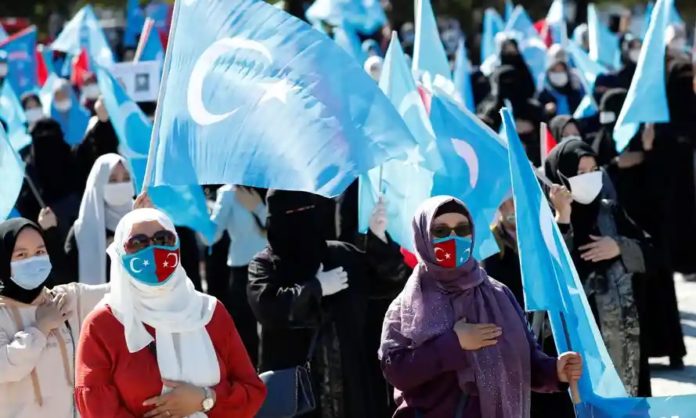Washington: As China’s human rights record came up for Universal Period Review (UPR) at the UN, the Government-in-Exile of East Turkistan, also known as Xinjiang Province in China, has said the international community must move beyond the diplomatic means and urgently take “decisive” and “tangible” actions to stop genocide against Uyghur Muslims.
The East Turkistan Government in Exile (ETGE) said it acknowledges the international community’s expression of concerns and recommendations regarding China’s egregious human rights atrocities in occupied East Turkistan (Xinjiang).
“However, the ETGE underscores that the time for mere dialogue and recommendations has passed. There is an urgent need for immediate, tangible actions to halt the systematic genocide and crimes against humanity in Occupied East Turkistan, which are the direct consequences of Chinese colonization and occupation,” it said in a statement.
It noted that the recommendations made by at least 50 countries, including the US, UK, Australia, Belgium, Canada and Japan suggest measures from ratifying international human rights treaties to stopping the atrocities against Uyghurs, Kazakhs, Kyrgyz, and other populations in East Turkistan.
“While these recommendations signify a growing global awareness, they are glaringly inadequate in combating the scale and severity of China’s atrocities,” the ETGE statement said.
“The situation in East Turkistan is not merely a regional concern but a test of the international community’s resolve to defend human rights and justice,” it said.
ETGE President Dr. Mamtimin Ala emphasised that “Mere recommendations to a State committing genocide are inadequate. China’s actions in East Turkistan demand serious international intervention, not just in words but in concrete actions.”
The situation in East Turkistan in 2024 remains critical, with millions of Uyghurs, Kazakhs, Kyrgyz, and other Turkic peoples still interned in prisons and concentration camps under the false pretext of “counter-terrorism”, the ETGE said.
Meanwhile, millions more are being enslaved in forced labor camps and factories throughout East Turkistan, and even in many parts of China.
“Nearly a million Uyghur and other Turkic children continue to be interned in State-run orphanages and boarding schools, where they are indoctrinated to become so-called ‘loyal Chinese citizens’,” it said.
Mosques and other religious sites remain closed, and prayers are still banned. Uyghur and other Turkic intellectuals, community and religious leaders, entrepreneurs, and journalists continue to be imprisoned, it said.
The forced sterilization of Uyghur and other Turkic women, as well as the forced abortions of Uyghur and other Turkic babies, are alarming and require immediate global intervention, the ETGE said.
The ETGE urged the United Nations to address the roots of the issue by invoking the Declaration on the Granting of Independence to Colonial Countries and Peoples (General Assembly resolution 1514 (XV)).
This action would not only acknowledge the colonization and occupation aspects of the crisis, thereby facilitating a more comprehensive approach to resolving the situation, but it would also work to recognize and respect the East Turkistani people’s right to external self-determination, it said.
This, in turn, would lead to the decolonization of East Turkistan and the restoration of East Turkistan’s independence, which is the only way to guarantee and ensure the freedoms, human rights, and existence of the people of East Turkistan, the statement said.
Furthermore, the ETGE emphasized the need for a global coalition, uniting governments, international organizations, and civil societies in a concerted effort to impose stringent diplomatic and economic sanctions on China.
This coalition should also work to diplomatically isolate China until it ceases its campaign of colonization, genocide, and occupation and respects the rights of its neighboring countries, including East Turkistan, Tibet, and Southern Mongolia, it said.
“The ETGE calls for the international community to move beyond diplomatic recommendations and implement effective diplomatic and economic pressures, sanctions, and legal actions against China,” the statement said.
This approach is not only vital for the Turkic peoples of Occupied East Turkistan but also for those oppressed in Tibet, Southern Mongolia, Hong Kong, and China itself, it said.
“The ETGE believes that only through decisive, tangible actions can the international community bring about change in China’s human rights practices and secure a future of freedom and dignity for all nations and peoples suffering under its rule,” it said.








